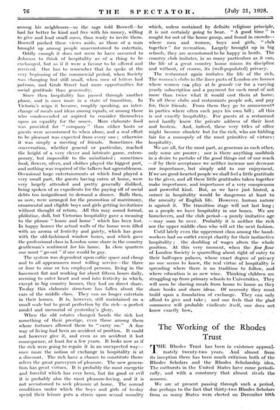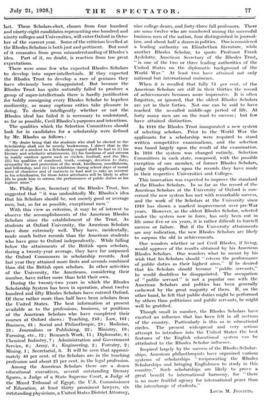The Working of the Rhodes Trust
THE Rhodes Trust has been in existence approxi- mately twenty-two years: And almost from its inception there has been much criticism both of the Rhodes Scholars and the Rhodes Scholarship idea. The, outbursts in the United States have come periodi- cally, and with a constancy that almost rivals the seasons.
We are at present passing through such a period, due perhaps to the fact that thirty-two Rhodes Scholars from as many States were elected on December 10th last. These Scholars-elect, chosen from four hundred and ninety-eight candidates representing one hundred and ninety colleges and Universities, will enter Oxford in Octo- ber of the current year. Some of the criticism levelled at the Rhodes Scholars is both just and pertinent. But most of it emanates from gross misunderstanding of Rhodes's idea. Part of it, no doubt, is reaction from too great expectations.
There were some few who expected Rhodes Scholars to develop into super-intellectuals. If they expected the Rhodes Trust to develop a race of geniuses they have obviously been disappointed. But because the Rhodes Trust has quite naturally failed to produce a group of super-intellectuals there is hardly justification for boldly consigning every Rhodes Scholar to hopeless mediocrity, as many captious critics take pleasure in doing. To decide intelligently whether or not the Rhodes ideal has failed it is necessary to understand, as far as possible, Cecil Rhodes's purposes and intentions.
The qualities which the Selection Committees should look for in candidates for a scholarship were defined by Mr. Rhodes as follows :
" My desire being that the students who shall be elected to the Scholarship shall not be merely bookworms, I direct that in the election of a student to a Scholarship regard shall be had to (i) his literary and scholastic attainments, (ii) his fondness of and success in manly outdoor sports such as cricket, football, and the like, (iii) his qualities of manhood, truth, courage, devotion to duty, sympathy for and protection of the weak, kindliness, unselfishness, and fellowship, and (iv) his exhibition during school days of moral force of character and of instincts to lead and to take an interest in his schoolmates, for those latter attributes will be likely in after life to guide him to esteem the performance of public duties as his highest aims."
Mr. Philip Kerr, Secretary of the Rhodes Trust, has suggested that " it was undoubtedly Mr. Rhodes's idea that his Scholars should be, not merely good or average men, but, so far as possible, exceptional men."
With this view as criterion, it may be of interest to observe the accomplishments of the American Rhodes Scholars since the establishment of the Trust. As Students at Oxford University, the American Scholars have done extremely well. They have, incidentally, made much better records than the American students who have gone to Oxford independently. While falling below the attainments of the British open scholars, during a twenty-year average, they have far surpassed the Oxford Commoners in scholarship records. And last year they attained more firsts and seconds combined than did the British open scholars. In other activities of the University, the Americans, considering their number, have rather more than held their own.
During the twenty-two years in which the Rhodes Scholarship System has been in operation, about twelve hundred and fifty Rhodes Scholars have entered Oxford. Of these rather more than half have been scholars from the United States. The best information at present available as to the professions, business, or positions of the American Scholars who have completed their courses at Oxford shows : Teaching, 243 ; Law, 161 ; Business, 61 ; Social and Philanthropic, 24 ; Medicine, 23 ; Journalism or Publishing, 22 ; Ministry, 19; Farming, etc., 12 ; Research Work, 11; Diplomatic, 8 ; Chemical Industry, 7 ; Administration and Government Service, 6 ; Army, 3 ; Engineering, 2 ; Forestry, 2 ; Mining, 1 ; Secretarial, 3. It will be seen that approxi- mately 40 per cent. of the Scholars are in the teaching profession and about 25 per cent. in the legal profession.
Among the American Scholars there are a dozen educational executives, several outstanding literary figures, a Judge of a State Supreme Court, a Judge of the Mixed Tribunal of Egypt, the U.S. Commissioner of Education, at least thirty prominent lawyers, six outstanding physicians, a United States District Attorney, nine college deans,. and forty-three full professors. There are some twelve who are numbered among the successful business men of the nation, four distinguished in journal- ism, and about half a dozen in politics. One isconsidered a leading authority on Elizabethan literature, while another Rhodes Scholar, to quote Professor Frank Aydelotte, American Secretary of the Rhodes Trust, " is one of the two or three leading authorities of the United States on the diplomatic background of the World War." At least two have attained not only national but international eminence.
When it is recalled that fully 75 per cent. of the American Scholars are still in their thirties the record of achievements becomes more impressive. It is often forgotten, or ignored, that the oldest Rhodes Scholars are yet in their forties. Not one can be said to have reached the so-called middle-age period of life. At forty many men are on the road to success ; but few have attained distinction.
In 1918 the Rhodes Trust inaugurated a new system of selecting scholars. Prior to the World War the applicants for a scholarship were required to • stand written competitive examinations, and the selection was based largely upon the result .of the examination. In 1918 the system was changed entirely. Selection Committees in each state, composed, with the possible exception of one member, of former Rhodes Scholars, judge the applicants upon the records they have made in their respective. Universities and Colleges.
This innovation was expected to improve the standard of the Rhodes Scholars. In so far as the record of the American Scholars at the University of Oxford is con- cerned the new system has met with remarkable success, and the work of the Scholars at the University since 1918 has shown a marked improvement over pre-War years. However, as the oldest Rhodes Scholar, selected under the system now in force, has only been out in life some five or six years, it is rather difficult to foretell success or failure. But if the University attainments are any indication, the new Rhodes Scholars are likely to surpass the old in achievements.
One wonders whether or not Cecil Rhodes, if living, would approve of the results obtained by his American Rhodes Scholars. One wonders what he meant by his wish that his Scholars should " esteem the performance of public duties as their highest aims." If he desired that his Scholars should become " public servants," he would doubtless be disappointed. The occupation of " public servant " is not a popular one with the American Scholars and politics has been generally eschewed by the great majority of them. If, on the other hand, he felt that public duties might be performed by others than politicians and public servants, he might well be gratified.
Though small in number, the Rhodes Scholars have exerted an influence that has been felt in all sections of the country. Particularly is this so in educational circles. The present widespread and very serious attempt to introduce into the United States the best features of the English educational system can be attributed to the Rhodes Scholar influence.
Inspired largely by the success of the Rhodes Scholar- ships, American philanthropists have organized various systems of scholarships " reciprocating the Rhodes Scholarships and bringing Englishmen to study in this country." Such scholarships are likely to prove a great benefit to international harmony, for " there is no more fruitful agency for international peace than the interchange of students."
LOUIS M. JIGGITTS.





















































 Previous page
Previous page